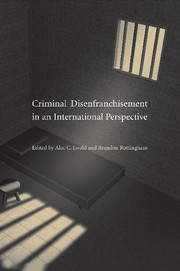Criminal Disenfranchisement in an International Perspective
Langue : Anglais
Coordonnateurs : Ewald Alec C., Rottinghaus Brandon

The book analyzes a contemporary policy question at the nexus of democracy, criminal justice, and constitutional citizenship.
This collection of original essays by leading scholars and advocates offers the first international examination of the nature, causes, and effects of laws regulating voting by people with criminal convictions. In deciding whether prisoners shall retain the right to vote, a country faces vital questions about democratic self-definition and constitutional values - and, increasingly, about the scope of judicial power. Yet in the rich and growing literature on comparative constitutionalism, relatively little attention has been paid to voting rights and election law. This book begins to fill that gap, by showing how constitutional courts in Israel, Canada, South Africa, and Australia, as well as the European Court of Human Rights, have grappled with these policies in the last decade. Chapters analyze partisan politics, political theory, prison administration, and social values, showing that constitutional law is the fruit of political and historical contingency, not just constitutional texts and formal legal doctrine.
Part I. Contemporary Disenfranchisement Law: 1. Voting rights and human rights: a comparative analysis of criminal disfranchisement laws Laleh Ispahani; 2. Punishment and social exclusion: national differences in prisoner disenfranchisement Chris Uggen, Mischelle Van Brakle, and Heather McLaughlin; Part II. Disenfranchisement in Comparative Perspective: Legal and Political Approaches: 3. US felon disenfranchisement: parting ways with Western Europe Nora Demleitner; 4. The right to universal, equal and non-discriminatory suffrage as a norm of customary international law: protecting the prisoner's right to vote Rick Wilson; 5. Our 'crooked timber': why is American punishment so harsh? Elizabeth Hull; Part III. Voting Rights and People with Criminal Convictions: Case Studies: 6. The politics and legality of prisoner disenfranchisement in Australian federal elections Ronnit Redman, David Brown, and Bryan Mercurio; 7. The campaign for prisoner voting rights in Ireland Claire Hamilton and Rick Lines; 8. The ballot as a bulwark: prisoners' right to vote in South Africa Lukas Muntingh and Julia Sloth-Nielsen; 9. The right to vote in Danish prisons Anette Storgaard; 10. In defense of prisoner disenfranchisement Christopher Manfredi.
Brandon Rottinghaus is Assistant Professor of Political Science at the University of Houston. He holds a Ph.D. in political science from Northwestern University. His primary research and teaching interests include the presidency, public opinion, democracy, and research methods. His work on these subjects has appeared in Journal of Politics, Public Opinion Quarterly, Political Science Quarterly, Political Communication, PS: Political Science, Presidential Studies Quarterly, and others. His work also extends into comparative politics (especially comparative political behavior and voting rights), and he has published work in Latin American Politics and Society and Electoral Studies. He is the author of the white paper 'Incarceration and Enfranchisement: International Practices, Impact and Recommendations for Reform' for the International Foundation for Electoral Systems (IFES).
Alec C. Ewald is Assistant Professor of Political Science at the University of Vermont. He holds a Ph.D. in political science from the University of Massachusetts Amherst. He has also taught at Union College and the University of Massachusetts Amherst. His research focuses on election law, American political development, and criminal justice; his work has been published in the Justice System Journal, Wisconsin Law Review, Columbia Human Rights Review, and Law and Courts. Several of his previous publications have examined felony disenfranchisement, and he has consulted with research and advocacy organizations, including the NAACP Legal Defense Fund, the Sentencing Project, The American Civil Liberties Union, and Demos. He is the author of The Way We Vote (2009).
Alec C. Ewald is Assistant Professor of Political Science at the University of Vermont. He holds a Ph.D. in political science from the University of Massachusetts Amherst. He has also taught at Union College and the University of Massachusetts Amherst. His research focuses on election law, American political development, and criminal justice; his work has been published in the Justice System Journal, Wisconsin Law Review, Columbia Human Rights Review, and Law and Courts. Several of his previous publications have examined felony disenfranchisement, and he has consulted with research and advocacy organizations, including the NAACP Legal Defense Fund, the Sentencing Project, The American Civil Liberties Union, and Demos. He is the author of The Way We Vote (2009).
Date de parution : 10-2014
Ouvrage de 302 p.
15.2x22.9 cm
Disponible chez l'éditeur (délai d'approvisionnement : 14 jours).
Prix indicatif 47,09 €
Ajouter au panierDate de parution : 04-2009
Ouvrage de 302 p.
15.7x23.3 cm
Thème de Criminal Disenfranchisement in an International Perspective :
© 2024 LAVOISIER S.A.S.



